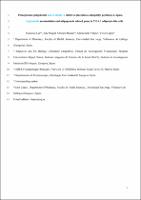Por favor, use este identificador para citar o enlazar este ítem:
https://repositorio.usj.es/handle/123456789/1109
Registro completo de metadatos
| Campo DC | Valor | Lengua/Idioma |
|---|---|---|
| dc.contributor.author | Les Parellada, Francisco | - |
| dc.contributor.author | Arbones Mainar, José Miguel | - |
| dc.contributor.author | Valero Gracia, Marta Sofía | - |
| dc.contributor.author | López Ramos, Víctor | - |
| dc.date.accessioned | 2024-02-08T08:05:59Z | - |
| dc.date.available | 2024-02-08T08:05:59Z | - |
| dc.date.issued | 2018-03-28 | - |
| dc.identifier.citation | Francisco Les, José Miguel Arbonés-Mainar, Marta Sofía Valero, Víctor López, Pomegranate polyphenols and urolithin A inhibit α-glucosidase, dipeptidyl peptidase-4, lipase, triglyceride accumulation and adipogenesis related genes in 3T3-L1 adipocyte-like cells, Journal of Ethnopharmacology, Volume 220, 2018, Pages 67-74, ISSN 0378-8741,https://doi.org/10.1016/j.jep.2018.03.029. | en_US |
| dc.identifier.issn | 0378-8741 | en_US |
| dc.identifier.uri | https://repositorio.usj.es/handle/123456789/1109 | - |
| dc.description.abstract | Ethnopharmacological relevance: Pomegranate fruit is considered an antidiabetic medicine in certain systems of traditional medicine. In addition, pomegranate polyphenols are known as powerful antioxidants with beneficial effects such as the reduction of oxidative / inflammatory stress and the increase of protective signalling such as antioxidant enzymes, neurotrophic factors and cytoprotective proteins. Aim of the study: This work evaluates the effects of pomegranate juice, its main polyphenols known as ellagic acid and punicalagin, as well as its main metabolite urolithin A, on physiological and pharmacological targets of metabolic diseases such as obesity and diabetes. Materials and methods: For this purpose, enzyme inhibition bioassays of lipase, α-glucosidase and dipeptidyl peptidase-4 were carried out in cell-free systems. Similarly, adipocytes derived from 3T3-L1 cells were employed to study the effects of ellagic acid, punicalagin and urolithin A on adipocyte differentiation and triglyceride (TG) accumulation. Results: Pomegranate juice, ellagic acid, punicalagin and urolithin A were able to inhibit lipase, α-glucosidase and dipeptidyl peptidase-4. Furthermore, all tested compounds but significantly the metabolite urolithin A displayed anti-adipogenic properties in a dose-dependent manner as they significantly reduced TG accumulation and gene expression related to adipocyte formation such as adiponectin, PPARγ, GLUT4, and FABP4 in 3T3-L1 adipocytes. Conclusion: These results may explain from a molecular perspective the beneficial effects and traditional use of pomegranate in the prevention of metabolic-associated disorders such as obesity, diabetes and related complications. | en_US |
| dc.format.extent | 22 p. | en_US |
| dc.format.mimetype | application/pdf | en_US |
| dc.language.iso | eng | en_US |
| dc.publisher | Elsevier | en_US |
| dc.rights | Attribution-NonCommercial-NoDerivatives 4.0 Internacional | * |
| dc.rights.uri | http://creativecommons.org/licenses/by-nc-nd/4.0/ | * |
| dc.title | Pomegranate polyphenols and urolithin A inhibit α-glucosidase, dipeptidyl peptidase-4, lipase, triglyceride accumulation and adipogenesis related genes in 3T3-L1 adipocyte-like cells (Versión aceptada) | en_US |
| dc.type | info:eu-repo/semantics/article | en_US |
| dc.subject.unesco | 3T3-L1 | en_US |
| dc.subject.unesco | Dipeptidyl peptidase-4 | en_US |
| dc.subject.unesco | Ellagic acid (CAS: 476-66-4) | en_US |
| dc.subject.unesco | Lipase | en_US |
| dc.subject.unesco | Polyphenols | en_US |
| dc.subject.unesco | Punicalagin (CAS: 65995-63-3) | en_US |
| dc.subject.unesco | Urolithin A | en_US |
| dc.subject.unesco | Urolithin A (CAS: 1143-70-0) | en_US |
| dc.subject.unesco | α-glucosidase | en_US |
| dc.relation.publisherversion | https://www.sciencedirect.com/science/article/abs/pii/S0378874117345889 | en_US |
| dc.identifier.doi | https://doi.org/10.1016/j.jep.2018.03.029 | en_US |
| dc.rights.accessrights | info:eu-repo/semantics/openAccess | en_US |
| Aparece en las colecciones: | Artículos de revistas | |
Ficheros en este ítem:
| Fichero | Descripción | Tamaño | Formato | |
|---|---|---|---|---|
| Pomegranate polyphenols.pdf | 2,57 MB | Adobe PDF |  Visualizar/Abrir |
Este ítem está sujeto a una licencia Creative Commons Licencia Creative Commons

